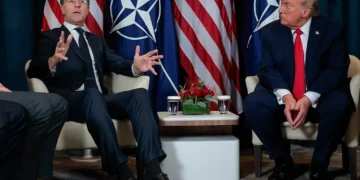For the past decade, the American government has been embroiled in debates over the role of surveillance in society. The constant battle between security and privacy has raged on, with no clear resolution in sight. And now, as we enter a new era with a new leader, the conversation around surveillance has taken a concerning turn. President Donald Trump has made it clear that he intends to use the power of government surveillance to target his political opponents. How did we get to this point, and what can we do about it?
Ever since the September 11th attacks, the United States has been on high alert for potential threats to national security. In an effort to prevent future attacks, the government implemented policies that allowed for extensive surveillance of its citizens. Despite initial pushback, these policies were largely accepted by the American people, as they believed they were necessary for the safety of the country. However, as the years went by, the extent of government surveillance continued to grow, even as the threat of terrorism had diminished.
In the midst of all this, Congress has failed to rein in the surveillance state. Despite numerous revelations of government overreach and violations of privacy, our elected officials have failed to take action to protect the rights and liberties of American citizens. Instead, they have continuously voted to extend and expand the government’s surveillance powers. And now, with Trump in office, these unchecked powers could be in the hands of a president who has shown a blatant disregard for civil liberties.
Trump has long been a vocal proponent of surveillance and has previously called for the monitoring of mosques and surveillance of Muslim communities. His administration has also been pushing for reauthorization of the controversial Section 702 of the Foreign Intelligence Surveillance Act, which allows for warrantless surveillance of foreigners outside of the United States. This reauthorization, which is set to expire at the end of this year, has been met with strong opposition from civil liberties groups and privacy advocates.
But it’s not just foreign surveillance that is of concern. Trump has made it clear that he intends to use the power of government surveillance to target his political opponents. This is a dangerous precedent to set. The government should not be used as a tool for political gain, and the power of surveillance should never be wielded for personal agendas. This goes against the very principles of a free and democratic society.
So how did we get to this point? How did we let the government’s surveillance powers grow to such an extent that a President could potentially use them against his enemies? The answer lies in our collective apathy. We have become complacent in the face of government overreach, believing that as long as we have nothing to hide, we have nothing to fear. But this mindset is dangerous. It allows for a continual erosion of our privacy and civil liberties, and sets a dangerous precedent for future leaders to abuse their power.
But it’s not too late to act. We must hold our elected officials accountable and demand that they rein in the surveillance state. It is imperative that we safeguard our right to privacy and protect our democracy from becoming a surveillance state. We must demand transparency and oversight in government surveillance programs, and ensure that they are only used for legitimate national security purposes.
It’s also important for us as citizens to educate ourselves on the issue of government surveillance and its impact on our society. We must have open and honest discussions about the balance between security and privacy, and actively engage in the decision-making process when it comes to our rights and liberties.
In addition, we must support organizations and individuals who are fighting for our right to privacy and against government overreach. These groups play an essential role in safeguarding our democracy and ensuring that our government is held accountable for its actions.
In conclusion, we must not turn a blind eye to the potential abuse of government surveillance by our current administration. It’s time for us to take a stand and demand that our government uphold the principles of democracy and protect our fundamental rights and liberties. Only then can we truly say that our country is a true beacon of freedom and justice for all.




